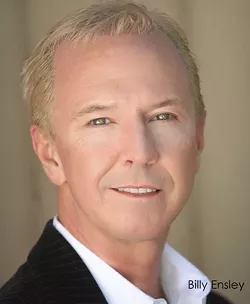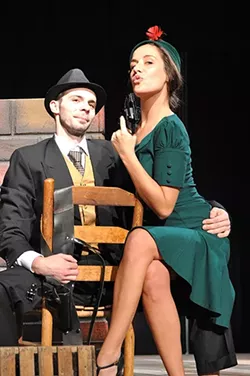"There will be gunshots," Billy Ensley promises. "There will be blood."
Ensley is discussing his latest project as director, Bonnie & Clyde, a musical based on the exploits of the two Depression-era outlaws who became folk heroes. When the story of Bonnie Parker and Clyde Barrow was turned into a movie in 1967, the studio advertised the film with the provocative tagline: "They're young. . . they're in love. . . and they kill people."
Even today, 50 years after the Academy Award-winning film premiered — and 84 years after Bonnie and Clyde were gunned down in a police ambush — the story of the pair's ill-fated love affair and crime spree still has the power to engage and unsettle audiences.
At least, that's how Ensley hopes audiences will react when the musical debuts at Matthews Playhouse on February 2. The show represents a recent shift toward edgier material at the community-based non-profit theater best known for its slate of family-friendly fare. As the production's director, Ensley is walking a tightrope trying to balance the play's tone and historical accuracy with the story's ability to make audiences empathize with the dustbowl desperados.
But right now, we're talking blood
"Several people are shot — a clerk, a bank teller and a police officer," Ensley says, adding that Barrow gang member — and Clyde's older brother — Buck meets a particularly gruesome end towards the close of the play.
Hopefully, there won't be too much fake blood on the floor, Ensley confides, but if there is, it will clean up eaily with just a quick swipe between scenes.
"It won't be like when I directed Evil Dead at Actor's Theater," he says. "There was so much blood with that show that the dancers were slipping in it."

- Director Billy Ensley. (Photo by Carlisle Kellam)
Ensley, who's been a mainstay in Charlotte's theater scene ever since he performed in Theater Charlotte's production of Seesaw in 1982, knows a thing or two about grabbing an audience's attention with controversial subjects. In 2003, he lobbied hard to bring Hedwig and the Angry Inch to the Queen City, directing and playing the title role in the transformative show's Charlotte debut. In 2011, director Ensley gave Rent, the popular celebration of community and creativity in the shadows of the AIDS epidemic, a powerful and passionate treatment. And in 2015 Ensley, again in the director's chair, breathed new life into Jesus Christ Superstar, adding an anachronistic chorus of sultry sirens in slinky cocktail dresses to the biblical proceedings.
A year ago, when Ensley met with Matthews Playhouse's executive director June Bayless to discuss shows he'd like to direct for the company, Bonnie & Clyde was at the top of his short list. (The play will mark the third show Ensley has directed for the Playhouse, following Shrek in 2016 and Joseph and the Amazing Technicolor Dreamcoat last year.) Bayless shared Ensley's fondness for the show, and six months later called him to offer him the opportunity to direct it.
"It is based on real people and I really like the music," Ensley says of the show. "I like the fusion of Broadway show tunes with country, rockabilly and blues." But his affinity for the material goes deeper than subject matter or aesthetics. He says audiences can connect with these historical characters because their tale relates to people today.
As director, Ensley must navigate a delicate path, one that doesn't trivialize or glamorize events, as he believes the popular 1967 film version starring Warren Beatty and Faye Dunaway did. "That was spruced up by Hollywood," Ensley saus. "Historically, it's all over the place."
Ensley stresses that the protagonists of the story killed innocent people and a policeman, and the director's concern for historic accuracy speaks from the heart. "My father was a captain in the Charlotte police department," he says. "I don't want to sugar coat this show. People need to see that reality as well as the love story. It cannot be just a love song between Bonnie and Clyde."
At the same time, Ensley wants to put the outlaw duo's exploits in context, so that their actions are understood.
Bonnie and Clyde came of age in the depths of the Great Depression, in the middle of the Dust Bowl, a devastating environmental and economic disaster. People were losing their farms and their homes, Ensley says, as their livelihoods dried up and blew away.
Fertile land became clouds of dust that blackened the sky. People were left utterly helpless; there were no jobs, no food and no hope.
At the same time, magazines and the early movie industry were glamorizing the gangsters of the day — John Dillinger, Al Capone and Baby Face Nelson — depicting them as latter-day Robin Hoods.
"That was a potent combination for these young people," Ensley says. "Bonnie and Cyde had the passion of young love mixed with this hopelessness plus the allure of bucking a system that didn't work."
Ensley believes there are parallels with today's political climate. Young people are faced with the difficulty of obtaining a higher education, and diminishing means to pay for it. "I hope the play is an illustration of extremes, however," he says, "and nothing more than that."

- Killers in Love: Steven Buchanan as Clyde Barrow and Lindsey Schroeder as Bonnie Parker. (Photo by Debbi Ballard)
To aid audience empathy and put theatergoers in an understanding frame of mind, Ensley and scenic designer John Bayless will use background projections to evoke the atmosphere that gave rise to the desperate path Bonnie and Clyde chose.
"We've compiled images that put the audience in that time frame, through pictures, newspaper clippings and mug shots," Ensley says. "We're using projections to help give the folks a sense of what these people were up against."
All of this establishes an evocative setting for the pair of ill-fated lovers/murderers. In casting the roles of Bonnie and Clyde, Ensley believes he struck pay dirt.
Lyndsey Schroeder, who plays Bonnie Parker, possesses a magnificent voice. "She brings natural beauty and wholesomeness to the role, and she combines that with bad-girl allure," Ensley says. "Lindsey's able to morph into a more hardened person as Bonnie did."
Likewise, Steve Buchanan brings a powerful voice and acting chops to his portrayal of Clyde Barrow. "Steve also has that bad-boy charisma that Clyde had, and together, he and Lyndsey possess the sexual energy that is so important to this show."
Rounding out the cast are Joe McCourt as Clyde's older brother Buck, and Emily Witte as Buck's wife Blanche. McCourt has worked with Ensley before, playing Roger in Rent, and the conflicted messiah in Jesus Christ Superstar. Ensley says McCourt nails Buck's masculinity as well as his subservience to his younger brother.
"Buck was crazy about his brother, and basically fell under his spell," Ensley says.
Blanche Barrow may be the most complex member of the Barrow gang, he continues; she's the only one of the four who had a moral compass.
Blanche was an emotionally immature young woman who fell madly in love with Buck, Ensley explains, which caused her to go down a path she normally would have shunned.
Ensley says Witte impressively pulls off the difficult feat of balancing Blanche's basic decency with her desperation, neediness and naiveté.
On May 3, 1934, Bonnie Parker and Clyde Barrow met their gruesome end and passed into American folklore. At Matthews Playhouse, Ensley hopes the two lovers and edgy thrillseekers will meet a kinder fate — the embrace of theatergoers from Matthews and beyond, looking for a spectacular musical based on gritty realism.
"This is unusual subject matter for a show," Ensley admits, and offers a comparison with perennial favorite The Sound of Music. "It's not surprising that someone made a musical about a singing family from Austria," he says. "But a musical based on a pair of killers — that's a little different."